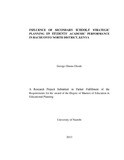| dc.description.abstract | The purpose of this study was to determine the influence of secondary schools‟ strategic planning on students‟ academic performance in Rachuonyo North District, Kenya. The study had four objectives; to determine the extent to which schools‟ mission statement influence students‟ academic performance, to assess how schools‟ continuous assessment strategy influence students‟ academic performance, to determine how schools‟ benchmarking strategy influence students‟ academic performance and to establish the extent to which schools‟ syllabus coverage strategy influence students‟ academic performance in Rachuonyo North District. The study was guided by the education production function theory. The study employed descriptive survey design targeting 43 principals, 301 Head of departments and 2154 form four students. The sample had 23 principals, 120 Head of departments, and 215 students. The research instruments used were mainly questionnaires and interview. Qualitative and quantitative data obtained from the study were analyzed using the statistical package for social sciences (SPSS) to increase accuracy of results. From the study it is established that; the majority of the schools had mission statement written on walls and entrance of school gates, however they were not always communicated across the school verbally. Another finding is that, a majority of schools who had put continuous assessment program in place in assessing their students‟ made a considerable value added progress on their students‟ academic performance. However the timeline was not well stipulated in many schools, this led to a clash of programs. It is further established that benchmarking is among the various strategies used by schools, practiced both internally and externally. Schools which used benchmark as a strategy, the study revealed that it positively influenced students‟ academic performance. A majority of the respondents indicated that, they use syllabus in lesson preparation and teaching, at the same time a majority of the students indicated that teachers normally inform them in advance about the content from the syllabus, a majority of the HoDs and principals indicated that they set targets for syllabus coverage by mid of June. From the study it is revealed that, early completion of syllabus allow the students to revise, gain confidence hence this influence their academic performance. The study findings have come up with the following recommendations, mission statement should be communicated always across the school and schools to tailor their programs on their school mission statement, schools to mobilize financial resources in order to engage in benchmarking and lastly schools should create more time for effective syllabus coverage in order to boost students‟ confidence in handling exams. The researcher proposes further research to replicate this study in schools in other districts in the country. A study on the barriers of effective implementation of strategic plan in schools and lastly a study should be carried on strategies for effective benchmarking in schools. | en |

